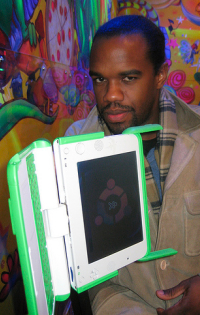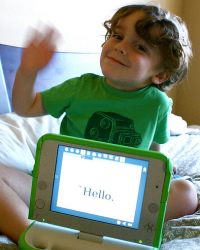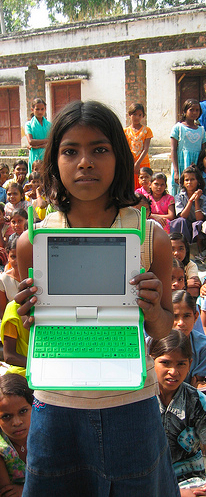So One Laptop Per Child as we knew it is now over. I'm sure there's a pony somewhere.
A PRONUNCIAMIENTO!: Let's see the current events as an opportunity.
A program of action for the community:
We, the community, need a unified sense of purpose and a structure while keeping the Bazaar spirit alive - that way we gain credibility - which gives us relevance but conserves necessary flexibility for different parts of the community.
So OLPC can be an education project, it can be a laptop project, hey, it can be a charity, a source of knowledge, or whatever people make it to be - sharing with others, receiving from others, creating opportunities for growth, being alive and life-giving.
- The business side of the equation can and should be treated professionally, and might need to be spun off the non profit side for legal reasons.
- Deployments have to contribute back. Small ones choose what they want to work on, and some Yalta consensus between bigger players might define specific big projects. There is a clear and definite understanding that everything works in a two-way protocol - that's part of gaining an education, and of showing by the example what it is to gain an education. Of course that works with kids too (or should).
- Big-idea players do not hold hostage everybody else to their own big idea. OLPC is not run like General Motors or Pan Am. That doesn't work no more. Big ideas have their chance, through standard meritocracy of Open Source community proceedings.
We are aware of our black eyes, because only by surpassing denial we can address and solve problems
- Marketing and delivery sucks. Maybe for good, honest and fair reasons, but it does.
- Deployment protocols likewise.
- Lack of content? big time.
- Two memes got established in contemporary world culture: the $100 price tag and the crank.
- The mesh
- Lennon (I must admit that I also thought it seemed like a good idea at the time)
We seem to know zilch as to how to get people to use the XO properly, in a scalable way that meshes with in-place education systems, and if we do, we are keeping that secret. Yes, a growing list of anecdotes show smiling kids and even a few smiling teachers, but there's a growing body of data that shows that as a median, the way we are doing it is not working quite - which is no news among programs that put laptops in educational settings.
We count our blessings, for we celebrate something that gives us energy to move forward
- The XO is totally awesome. In mid November I had given it 3 months to be superseded in price and features, but so far it seems to be holding.
- People do believe in us. Maybe not as many as we want do, but quite a few still, actually a lot, and if we work with them and respect them, they will love us, and even give us money.
- Two memes got established in contemporary world culture: the $100 price tag and the crank.
- Properly used, the XO surpasses any electronic learning tool in the market. Hey, there's a HUGE market out there for crammer tools. Could we turn some of it around so it's not just cramming, but also educating? That would be a win-win proposition to many school districts in places where access to higher education is competitive.
And the most important: we are not giving up. We, the community, will keep going as we can. We will help you, Dr. Negroponte, because we are inspired by the (original) vision of "One Laptop per Child". We also, two-way process, need your help to make it happen, for the success of this project that you and we own together.
This is an unparalleled opportunity to get rid of the extra baggage.
- Now that we have to run leaner, we will actually communicate with, and listen to the community, not because it's cheaper, but because it is better - it gets us where we want to go, faster than any contractor ever will, and we no longer can afford to run things without the community - we never could afford it, really.
- Actually, we will invest in the community resources we are freeing from what we no longer (and never did) need to have done in house, because we have realized we have a goal, and that goal is to educate, not just kids, but the community, volunteers, teachers, and then it will seem like work with the kids happens by itself.
- XOs will be sold, by an outside company, to all comers. Special deals will be available, for huge quantities and whatnot, just as is standard practice in any goods business, but a simple process for buying 1 or 200 will be in force.
- The Learning Team will be spun off, as a consulting business, to be hired by a deployment sponsor if he wants to.
- OLPC will actually develop best practices based on facts, and gain credibility to actually be invited to partner by those with deep pockets.
- Results from deployments will be shared, accountability of resources will be public, and a community system to track requests and processes will allow certain strategic points to finally be successful, for example the XS.
- Working with the community is priority: employees doing this coordinating will be seen as core to the concept, (given a raise) and definitely encouraged to help the community help itself in taking ownership of tasks to be done, which will free resources for further community encouragement, support and growth, hopefully creating a self-sustaining reaction that will bring in donations and enable R&D to proceed at a fast pace.
And since I myself do not know everything, the community and executive team will be able to take from these ideas I put what they can work with, and improve, add, and make the Education Project be the center, while not giving up on those green bricks with the cute ears that I personally consider are a very totally awesome piece of hardware.
This was original published on the OLPC Wiki so it can be a together-work by us all.





@Yama,
Go for it!
As the perennial, proverbial, backseat driver, I can still admire good "steermanship".
Good (and bad) software never dies, it neither fades away. Even if it is Cobol. So any code created for the XO will be around almost forever.
Winter
It's hard to see OLPC surviving in these hard economic times where companies are truly reluctant to throwing money at suspect projects.
Ad, yes, the OLPC Project has been very suspect from the beginning. Two great reasons the project is "suspect":
1. It is based on the demented premise that handing elementary school kids a laptop will result in an education.
2. It relies on selling computers to people who don't have money for water, electricity or education!
3. Professor Negroponte has always relied on hype and outright lies to promote his idea. His "final product" is 4 times the promised price with 4 times fewer features! Not a recipe for success...
1) How is it 4 times more expensive? $200=$100*2
2) The poor who cannot afford a laptop aren't the ones who pay for it.
I thought these items were quite clear. I fail to understand the need for creating misleading information.
"1) How is it 4 times more expensive? $200=$100*2"
Last time I checked, the laptops are being sold at $400, which includes a forced "donation" (yes, it is forced, as there's no alternative; a real donation would allow people to buy for 200 AND donate $200 or just buy at $200, but Negroponte does not trust the giving spirit of his followers)
"2) The poor who cannot afford a laptop aren't the ones who pay for it."
Last time I checked, the poor are not getting them for free. Peru, Uruguay and the one or two other buyers have each paid over $200 for the device. Any other buyers (poor people from poor nations, Negroponte's stated target) will have to pay similar amounts. So, yes, Negroponte's target are people who can't afford water, electricity or education; supposedly, they can afford a useless (for education purposes in the hand of elementary school kids) $200 device. Absurd.
As Allen (another poster) said, people have spoken with their checkbook: the anticipated sales in minimum amounts of 1 million have never materalized and the G2G2 Program has been an utter failure.
The writing is on the wall.
I fully endorse your demand for what you call "community involvement." I did my dissertation on the acquisition of computer technologies. One of the major results was that end users have to be intimately involved for the acquisition to be a success. This really is an obvious conclusion if one considers the whole system.
Neal, I so much agree with you that I did my main presentation for Sugarcamp in November on buy-in by teachers being the single most significant element in success. Googledocs presentation here.
Take a look at OLPC Nepal, where things were started by meeting with teachers AND parents, and then look to the big, consultant-for-hire based ones. There's places where over 60% XOs were broken their first 6 months.
Winter, Irv, long time no see! Good to be back and see you doing well, overwhelmed by too much going on, because I am trying to implement this very same thing (walk my talk, eat your own catfood, etc) for Bolivia and anyone else who will want in.
You're good friends that I have never met, and who saw my baby steps in all things OLPC through OLPCNews about a year ago. Boy, did we have fun! Was I totally clueless! Winter, I still keep a printout of one of your articles in early 2008 - you may notice some of that spirit coming back right here.
Silly typo, big difference. It should have said OLE Nepal